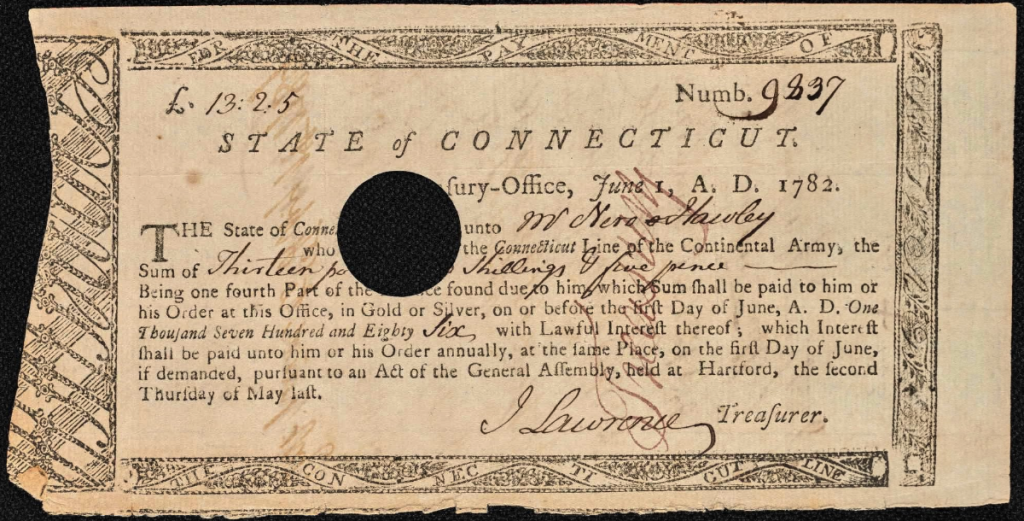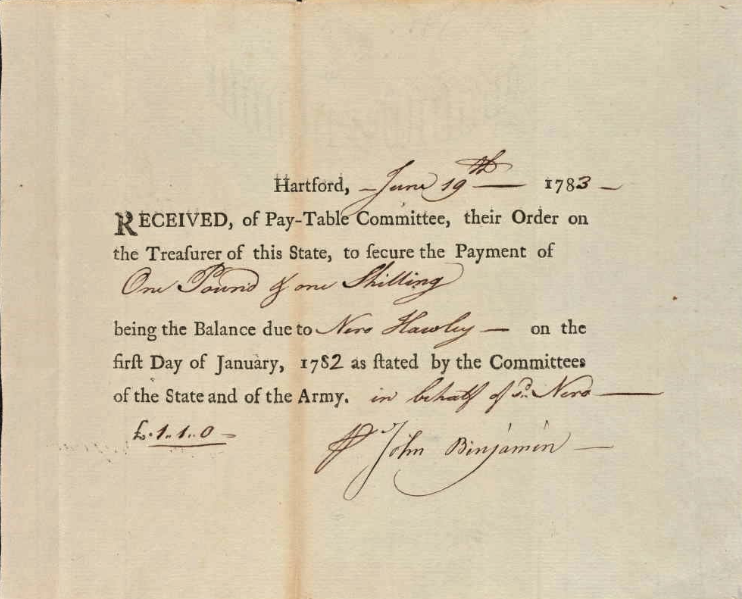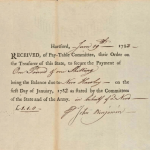We are pleased to announce that we have added a new collection of records for Black and Indigenous Soldiers who served in the Revolutionary War. These records are primarily manuscripts dating from 1775-1783, including muster rolls, pay vouchers, and enlistment records.
Barring a few units, the Continental Army was mostly integrated. Black and Indigenous men served alongside white soldiers and had an equal pay base despite discriminatory policies pertaining to enlistment and rank.
Most Blacks serving in the Revolutionary War fought on behalf of the British. However, some free Black men joined the Continental Army voluntarily. Enslaved men, on the other hand, were forced to enlist by their enslavers, often for profit, and they were not allowed to enlist of their own free will.
At the onset of the Revolutionary War, there were over 80 Indigenous nations east of the Mississippi River. Some opted to remain neutral, but most nations – including the Cherokee, Kickapoo, Shawnee, Mohawk, and Seneca – joined the side of the British. Others, like the Oneida and Tuscarora, sided with the colonists, and some Native men chose to join the Continental Army.
The records in this collection are varied, but some of the following may be available:
- Name
- Birthdate and place
- Date and place of enlistment
- Unit, regiment, and rank
- Names of other unit members
- Occupation
- History of enslavement
- Military history
- Physical description
These records can help reveal the stories of Revolutionary War soldiers like Nero Hawley. Hawley was enlisted in the 2nd Connecticut Regiment as a substitute for his enslaver, Daniel Hawley, in 1777. During the Battle of Stony Point in 1779, one of the most dramatic battles in the war, Nero was severely injured. He was discharged in April of 1781 and officially obtained freedom and a pension in return for his military service. Nero returned to a more simple life as a free man in Connecticut, where he worked at a brick mill. He died in 1817 at the age of 75.

Explore this new collection today to learn more about the Black and Indigenous soldiers who served valiantly during the Revolutionary War. Then, search for additional records in other collections, including Service Records, Revolutionary War Rolls, and Revolutionary War Pensions. Search Fold3® today.


Who cares? Soldiers who fought for America, fought for America. That’s it.
A great deal of people care. Anyone who loves history should care. An organization that will certainly care is the Daughters of the American Revolution. This effort by Fold3 fits in perfectly with the DAR’s E Pluribus Unum education initiative. You can read more about it here: https://honoringourpatriots.dar.org/e-pluribus-unum-main/about/
It’s great to learn more about under-represented Patriots.
Descendants care, historians care, people who learn from historical lessons instead of repeating them care. HIstory matters, especially the context of this article.
Consider this: Any idea of why Native Americans became a less-tolerated group, following the majority of the civilized tribes siding with Britain?
Kudos to those who help fill in the gaps of American history!
The SAR (Sons of the American Revolution) Cares because they fought for this Country .
Myself care because I am a member of the SAR and I love History and our Country.
These records were previously unavailable. That is why I care.
I care–the dars have their annual flag burning on my hay field with all the bands,bells,and whistles
I care! So at least one person does
I care. My 5th great-grandfather, who was a free person of color, fought in the Revolutionary War. It matters to me, because white geneologies and history is readily available, and it is very hard, because of slavery, to find documentation of our ancestry. Yes, all ethnicities fought for America, but not all were treated as equals throughout history due to skin color.
My 5th great-grandfather, who was a free person of color, fought in the Revolutionary War. It matters to me, because white geneologies and history is readily available, and it is very hard, because of slavery, to find documentation of our ancestry. I care because this research made public puts to death the myth that the war for America’s freedom was fought for by all ethnicities, but not all were treated as equals throughout history due to skin color.
Some soldiers endured great injustice while also suffering the travails of war. This injustice should be acknowledged alongside their fight for America.
Pay no attention to “Bob” (“Cratchet?”). Thanks for this information! I’m always looking for more details on my 4x-great-grandfather and his brother who served in the Revolutionary War and wintered at Valley Forge with Washington. His pension records (found on Fold3) include his testimony of his entire time of service (he was honorably discharged and re-enlisted 4 times!). I will definitely be looking at these records!
I just think it’s wrong to always be looking up things for the black Americans my grandfather served he was a decorated vet and was never honored more than a metal then sent home no financial compensation his health care was hellacious and he chose to serve he was American and guess what, I want to know who determines what exactly white is anyway!
We have lost the definition of respect and pride. I have traveled by Ancestry for the past 10 years – retirement. Our past gives us much. It gives us respect, pride and the ability to change. Looking at my past, I know my people were poor, but they were scrappers! They fought and scrapped since the French & Indian War. It is my basic DNA. I may not fight, as in a war, but I have scrapped to survive, improve who I am and who my legacy will become. I served as a civil servant for 32 years and my husband is retired military. We have found that our folks were strong people, good people and some with weaknesses…but Ancestry/Fold3 has allowed me to look back and see the fiber of who I am. I feel if we are looking for the right thing, we will find it. Were your people Chiefs in America or in Africa. What was their opinion at that time. Does it differ from mine. Respect the past, take pride in your past and see what you and your folks have become or what you have learned from that past.
Kim, I too, will be looking and appreciating all the tools made available through Ancestry. What was their legacy, one of pride or indifference? What will your legacy be, one of hate & war or one of standing up for your beliefs and healing peace. No one loves peace more than a Soldier.
I think Bob may have meant they all served & should be honored & disliked the separation of these soliers from the others.
Let’s hope so but the tone didn’t feel like that. As an African American finding records for men of color for the revolutionary war is difficult! I am a descendant of on of the Signers of the Declaration of Independence. Actually Gov Benjamin Harrison V of the Berkeley Plantation in Charles City Virginia. So there are no records of him fighting but there was a man I found a record for Jonathan Quivers of Connecticut and I did find his revolutionary War files. One said he was treated as if he were a white man. That in itself was an indication that he might have been Native American or some other ethnicity.
Exactly!!!
Yeah well, black folks have gotten the short end of the stick for my entire lifetime and they are not the ones that separated themselves from everyone else!
The separation of slave from free is extremely important to those of us who are descendants of slaves. Remember, Bob, we were considered less than human and these records prove differently. We fought for a country that would SELL US OFF at a moments notice, yet WE FOUGHT!!!!!
If official records had been kept for Black people in Colonial/Post Rev War era the SAME as they were for white people, this would be insignificant. Unfortunately, service records may be the ONLY records available for black soldiers. Anyone with a minor knowledge of genealogy understands this.
You are so right!
The people who care are the descendants because that help explain elements of their family. When you understand what your ancestors did to help keep this country free and safe is important to us all. Knowing that some were forced to serve in leu of their owners means that even forced to serve they did serve. I hope that they have the records of the women who dressed as men who served during this period.
I care. I am just now reading “A Girl Named Samson” about a young woman dressing as a man in the American Revolution. The main character, Deborah Samson, did serve as a man. The book is a historical novel and as such is not all true, but she did serve. So, Joyce, there are books and records of the women who dressed as men and served voluntarily. I am a descendant of many Revolutionary soldiers and a member of the National Society of the Daughters of the American Revolution. Google “lineage societies” and you will find many groups celebrating their ancestors.
I care, because all too often, after their service, these soldiers, even as free men, disappear from our history with their families because of their racial status. Their service may be the only public record they have, but everything we can find returns their life to us. Unfortunately, they are hard to find in our cemeteries because of their racial status. Even as free Americans who fought for their adopted country, all too often, they were still erased from history. Sometimes, they dropped their slave name (can’t blame them for that) and took new identities, which makes it even harder to track them today. Real history is personal, well beyond the names in our history books. Everyone in our cemeteries has a history and was part of our collective history, but to not even have a name, or even a stone, is a disgrace. Even here in New England, all too often there may be a “black” section, and it’s empty space or small blank rough cut stones. If we’re lucky, they might have initials on them or just a first name. The more we can learn about these folks, the more we can understand from whence we all came, which allows us to return dignity to who they “are,” not just who they were.
In Garrison Cemetery in Woods County Oklahoma near Dacoma, there is a stone along the fence row that simply reads A Colored Girl.
Bob, there’s a reason why. Bless your heart
We, indigenous people and slave decendants care a lot! It is more important now than ever to see and publish historical documents. There are people who seek to rewrite history!
“At the cross, at the cross, where I first saw the light..” the ground is level at the foot of the cross.
My Native American Revolutionary War ancestors were in Virginia. Charles Lewis and his brother Ambrose served as Seamen and Soldiers from Fredericksburg. My ancestors Rawley Pinn his brother Robert and nephews Billy James and John fought at the Siege of Yorktown along side George Washington. Rawley Pinn’s unit marched from Amherst County with Marquis De Lafayette to Yorktown Battlefield. It was not until I located the rosters and proved my ancestry that I was accepted into the DAR for my ancestor Charles Lewis. Now all of my ancestors are included in the DAR Records!
Anita, I love this so much!
I’m wondering if Joseph James Maguire is recognized for all the wars he fought in for America’and god bless all who fought in any wor
If a formerly enslaved man enlisted in a Continental regiment to fight for the independence of the new United States, that is remarkable. This guy not only fought for his country’s freedom, he fought for his own. A lot of the soldiers of color obtained their freedom by enlisting. There are all sorts of side questions too. Did the family that enslaved him keep part of his bounty and wages? These records are invaluable for historical research. Thanks Fold3!
I too have appreciated all that ancestry offers. I have been able to find relatives that served in all wars from Revolutionary to Iraq.
all of the men and women that have served no matter what color are to be honored and respected.
As a great granddaughter of a Captain in the Revolutionary war I care! I discovered my history starting in 2014 when my veteran son returned home and asked about his heritage. I have relatives that are African American and I know they care as well!
You all handled this discussion with respect I admire you.
This is so cool! So wonderful that history is preserved. I may not have ancestors (I’m Mexican descent) who fought in the Revolutionary War but I had no idea they preserved the names and identities of minorities who fought!!
Much appreciated…
Anne Walker
The Daughters of the American Revolution put out a book, a massive tome really, several years ago titled “Forgotten Patriots – African American and American Indian Patriots in the Revolutionary War”. It gave names, states served from, and a key to references where the information was found, as it did not go beyond simple name listings since the book was already huge. I bought a copy. Sadly, it is no longer in print, but it may still be found in libraries that had the foresight to buy it or have a copy donated.
I care. These records are important part of history as well as Genealogical value. Good or bad if it wasn’t for this part of history this country wouldn’t be the free country it is for all of us.
I care my family have served in the armed services as far back as we can trace my list goes like this:
My father
4 Brothers
2 Uncles
5 Nephews
4 Nieces just to name a few , there’s plenty more family members some are enlisted now
Give them honor
Give them respect
If not for them
Where would we be???
Bob, Most of the Blacks and Native Americans who fought for America had little to gain, even if the Colonists won. They were still second class citizens for the most part. This information is an interesting counter to the White Supremist crowd, many of whose ancestors weren’t around when these Blacks were fighting to help create a new nation.
THIS IS A CORRECTION TO MY EARLIER POST:
My 5th great-grandfather, who was a free person of color, fought in the Revolutionary War. It matters to me, because white geneologies and history are readily available, and it is very hard, because of slavery, to find documentation of our ancestry. I care because this research, made public, puts to death the myth that the war for America’s freedom was fought for by only White people. It proves that all ethnicities fought for the cause of liberty and democracy, despite the fact that not all were treated as equals throughout history due to skin color.